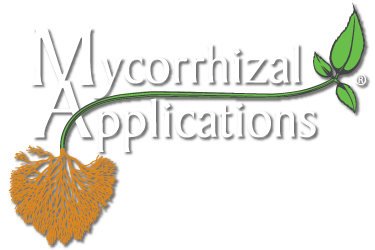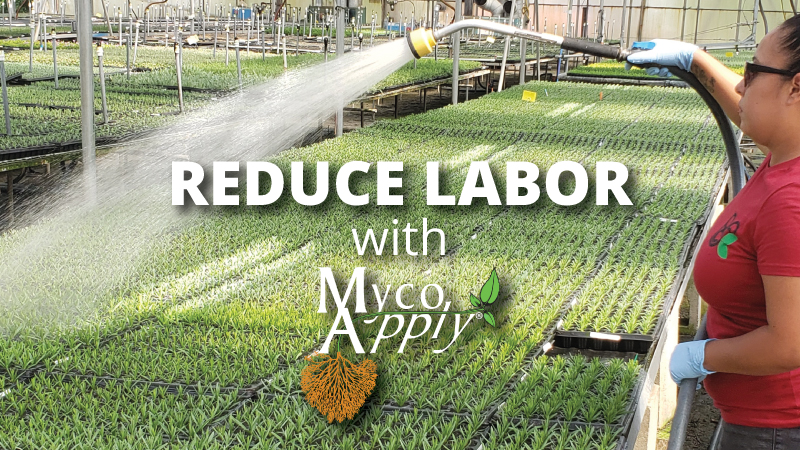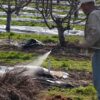In July 2019 Ken Fisher, AmericanHort’s President and Chief Executive Officer, stated in his Keynote address that having an adequate labor supply was one of the horticultural industry’s greatest threats. A lot has happened since Ken gave that speech, but the 2019 fear of a labor shortage is now a 2021 reality. All of us must be open to new ideas so that we can effectively resolve the problem.
Before I explain how mycorrhizae can help a grower, landscaper, or retailer reduce their labor needs, I think it might be best to give a quick overview of the role mycorrhizae can play in a plant’s life. Mycorrhizae are a naturally occurring soil fungal organism that forms a symbiotic relationship with close to 95 percent of all plants. The plant supplies sugars and lipids that are produced during photosynthesis to feed the mycorrhizae and in return, the mycorrhizae expand the plant’s root absorptive area by the development of an expansive fungal hyphae network. This network is both more effective and efficient at the uptake of water and nutrients than the plant’s roots, but the new fungal hyphae network can expand beyond the plant’s normal depletion zone and access water and nutrients that would not be available to the plant without the mycorrhizal relationship. The increased supply of nutrients and water reduces the stress experienced by the plant and allows the plant to focus on its purpose: flowers, yield, etc.
The use of mycorrhizae is not the single “golden ticket” to get rid of all your labor shortage woes. But the use of mycorrhizae can be part of the solution in helping your business to reduce the need for labor. The potential for labor reduction can happen in a variety of ways and can impact you differently depending on your location in the horticultural value chain.
Grower
Production labor usage can, directly and indirectly, be reduced by the use of mycorrhizae. It can happen from the reduction in fertilizer and pesticide applications labor due to mycorrhizae improving nutrient uptake and plant health. Watering labor can be reduced, resulting in fewer labor hours as the plants more efficiently uptake water and store it during times of excess for use during times of need. Growers can also experience more uniform plant growth resulting in a more uniform production, which in turn results in less labor usage. Automation becomes more efficient when the crop is more uniform, so the use of mycorrhizae could help you be better able to realize potential savings from automation. Production times can also be reduced allowing for fewer labor hours to produce the same crop. And finally, with a healthier and more uniform crop, you should expense fewer labor hours cleaning up after a crop.
Landscaper
Potential labor reductions for landscapers can happen both at the time of installation and during maintenance. During installation, labor can be reduced by the reduction or elimination of plant replacements since transplant shock is reduced or eliminated with mycorrhizae use. Maintenance contractors reduce their labor by needing to apply less fertilizer and pesticide applications due to the mycorrhizae improving nutrient uptake and overall plant health.
Retailer
Ideally, retailers should only purchase plants from growers that use mycorrhizae. The use of mycorrhizae enhances a plant’s ability to handle stress during shipment to its garden center. Plants simply come off the truck looking better and more appealing to the public. If the plants are not immediately sold due to weather or other market complicators, plants grown with mycorrhizae have an improved shelf-life. This trait reduces plant maintenance costs(labor) and additionally reduces plant losses(labor) and returns at retail (labor). Reactive labor at retail will be less since the associates will spend less time resolving customer issues and complaints. And more of their time will be able to focus proactively on selling.
Mycorrhizae are not the only answer to reducing the need for labor by the horticultural industry. However, mycorrhizae can play a role in reducing labor at production, landscape installation, landscape maintenance, and retail. If that is not enough, the usage of mycorrhizae will also help the end-user have a more positive experience with the plants you grow, install, maintain, or sell leading to more repeat business. Which we can all agree is good for the industry.
If you have any questions about anything covered in this article or MycoApply Mycorrhizae, please contact your local Mycorrhizal Applications Representative or call 866-476-7800 or email us at inquiries@mycorrhizae.com.







